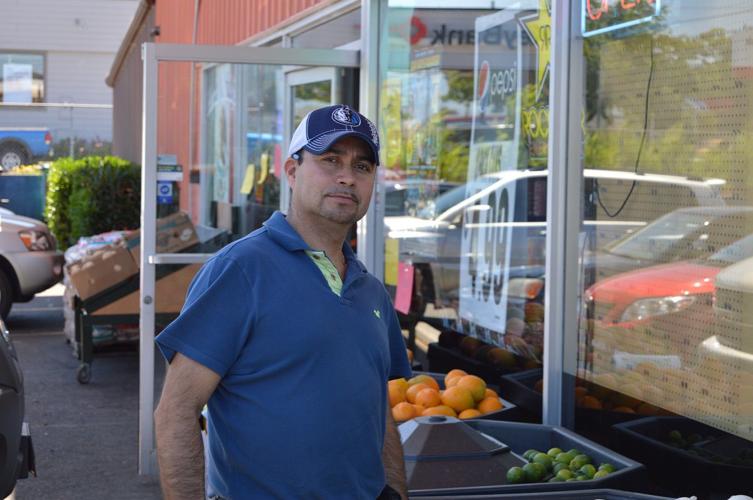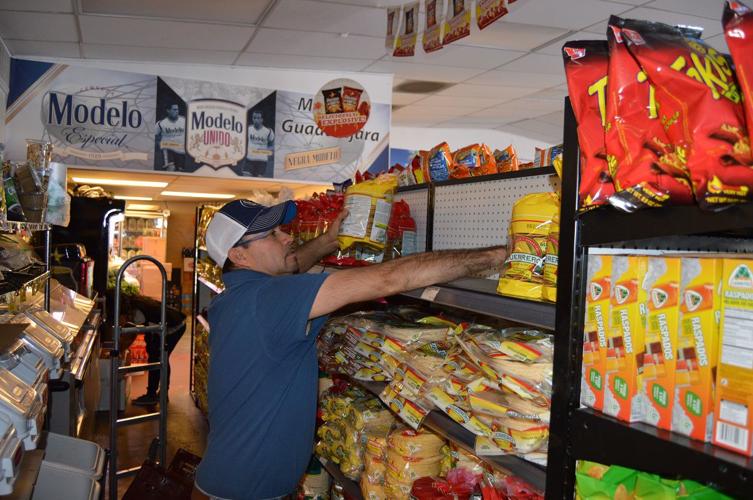In the early 1990s, while working in a local orchard, Gerardo Bobadilla was challenged by an old-time farmworker to change the course of Mexican history in the Hood River Valley.
And that is the short version of how Bobadilla came to open Mercado Guadalajara, located at 1802 12th Street (across from Rosauers) six years ago.
The longer version is more complicated. Bobadilla grew up in Ixtlan del Rio, Nayarit, Mexico, and opened his first produce stand at the age of 12. He had been working at a produce stand for a youngish-boss — Jorge, who was around 22 — who told Bobadilla he liked his work ethic and wanted to help him open his own stand. Jorge provided him with his first inventory.
Fast forward to 1990, when Bobadilla moved to the United States, first coming to Los Angeles — where he was extremely unhappy — and then to Hood River after being invited by his Uncle, Trino Murillo, who was interested in starting a Mexican rodeo and wanted to use Bobadilla’s horse expertise.
After a month in high school (he got tired of daily discrimination), he quit and began a five-year rotation of planting trees for the US Forest Service a few months out of the year nationwide, and then pruning trees and picking fruit for a local orchardist.
It was during one of those shifts in the orchard that inspired him to change course.
“I heard this guy tell me he didn’t want to see me no more. He said, ‘That’s not why you come to the U.S., you come for success, to be somebody. This is the history we’re creating — you guys have to change this. That’s why I ask you not to come back again,’” Bobadilla said.
Those words stuck with him. One day, while shopping at The Dalles Safeway with his wife, Guille, he realized he wanted back in produce sales. Guille encouraged him to apply, but only checkout clerk positions were available.
So that’s where he started. It only took a few weeks before he was transferred to produce. His work ethic got him promoted, and soon he was offered the produce manager position.
But he didn’t take it.
There were many reasons why he didn’t, but ultimately it came down to remembering what he had been told by the older man in the orchard.
He ended up purchasing a tortilla distribution route with Gruma (who own Mission and Guerrero brands) in the Gorge, with help from his family while still employed at Safeway. Slowly his profits grew and he was able to quit his produce job and concentrate on his route.
That too grew. He moved his family — he had two children now, daughter Kimberly and son Gheraldy — from The Dalles to Vancouver, but they were unhappy. Bobadilla knew how much his tortillas were sold to stores, and how much the stores charged in turn, and started thinking about opening his own store.
One day, while delivering tortillas to Rosauers, he saw that the old dealership across the street had a space for rent. It took six months before Mercado Guadalajara would open, but “since the first day it’s been busy,” Bobadilla said.
He started with six employees; he now employs 22.
His day starts at 6 .m. with tortilla deliveries — yes, he still delivers on his Gruma route, but now just in Hood River. From there, he’s “on the phone all day long,” talking to suppliers. He generally gets to the store by noon and is home in The Dalles around 10 p.m.
“Without my wife, I’m not able to do it,” he said. “It’s 50-50 here. She takes care of the kids, house, paperwork, bills. What I do is the physical work, or the ideas.”
The market isn’t quite his dream store — this one is 3,000 square feet, and he’d like 10,000 — but it’s filled with close to 3,000 Mexican items and includes a bakery. He strives to “have everything in one store for the Hispanic community,” but sees a lot of crossover business.
“Whatever we put out on the shelf, we sell,” he said.
He’s in the process of a small expansion, which will allow him to increase his offerings. More space also means he can buy in bigger quantities, which lowers the price on his end and thus lowers the price for his customers — an important point for him, because his customers work hard for their money, he said.
But his success has come with a high personal price.
“It’s been hard to put everything on balance,” he said. “Where I grew up was very poor. Part of my success, I see where I was when I was a kid. My father teach me how to work, how to be successful.”
He feels lucky to have been brought to the U.S. by his parents because, though they didn’t have a lot beyond essentials, he did have his parents “24/7.”
“I changed that history with my kids,” he said. “They don’t have me but they have everything. They’re not happy — they want me more. For them, to have what they have, they don’t have me at special times.
“If I had the option to stay with the kids, I’d stay with the kids.”






















Commented